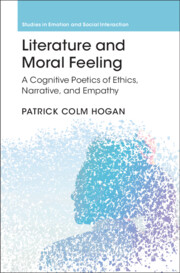Book contents
- Literature and Moral Feeling
- Studies in Emotion and Social Interaction
- Literature and Moral Feeling
- Copyright page
- Dedication
- Contents
- Figures
- Acknowledgments
- Introduction:
- Chapter 1 Defining Ethics
- Chapter 2 The Implied Ethics of Julius Caesar
- Chapter 3 Narrative Universals, Emotion, and Ethics
- Chapter 4 Ethics and Narrative Genre:
- Chapter 5 Emotion and Empathy
- Chapter 6 The Dynamics of Empathic Response:
- Chapter 7 Evaluating Empathy
- Chapter 8 The Critical Empathy of Angels in America
- Afterword:
- References
- Index
- Studies in Emotion and Social Interaction
Chapter 5 - Emotion and Empathy
Published online by Cambridge University Press: 21 April 2022
- Literature and Moral Feeling
- Studies in Emotion and Social Interaction
- Literature and Moral Feeling
- Copyright page
- Dedication
- Contents
- Figures
- Acknowledgments
- Introduction:
- Chapter 1 Defining Ethics
- Chapter 2 The Implied Ethics of Julius Caesar
- Chapter 3 Narrative Universals, Emotion, and Ethics
- Chapter 4 Ethics and Narrative Genre:
- Chapter 5 Emotion and Empathy
- Chapter 6 The Dynamics of Empathic Response:
- Chapter 7 Evaluating Empathy
- Chapter 8 The Critical Empathy of Angels in America
- Afterword:
- References
- Index
- Studies in Emotion and Social Interaction
Summary
The fifth chapter marks the turn from descriptive to normative ethics – thus, what ethical ideas should guide moral actions. This half of the book does not set out a detailed ethical theory but advocates a general criterion for setting ethical parameters and adjudicating among ethical–narrative prototypes. That criterion is an effortful generalization of empathy. The particular stress on empathy derives from the basic definition of ethics, presented at the beginning of the book. This chapter draws on current cognitive and affective science to outline an account of human emotion and empathy. This account differs from common views of empathy in several ways. Most obviously, it does not construe empathy as sharing the same emotion as a target. Rather, empathy is a scalar concept that refers, fundamentally, to experiencing the same emotional valence as a target. That positive or negative empathic feeling is based on one’s own experiences, which may be more or less similar to those of the target.
- Type
- Chapter
- Information
- Literature and Moral FeelingA Cognitive Poetics of Ethics, Narrative, and Empathy, pp. 150 - 181Publisher: Cambridge University PressPrint publication year: 2022

